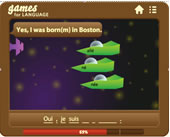by Ulrike Rettig

Several years ago, my husband and I prepared for an extended stay in Italy by learning Italian with the three 30-lesson courses of a well-known audio CD program. Arriving in Italy, we could communicate well enough - although not speak fluently. However, we could read Italian only with difficulty, and writing it was a disaster. We kept spelling everything the French way, French being a language which we both speak fluently.
Before our trip, we had also looked at other CD and DVD programs and had tried several, including Rosetta Stone. But as the vocabulary did not match our interests or needs, it was hard to stay motivated and we were quickly bored. For example, in one of the early lessons of RS, we practiced (multiple times) all of the following sentences: the women are eating rice, the girls are reading, the horses are running, the boy is not driving.
Gamesforlanguage was born from of a simple idea: Learn language in a relevant context. If you can repeatedly hear, read, write, and speak the words, phrases, and sentences of a story, you'll remember them more easily, because you remember the context. To learn a new language, you have to connect it to your own experiences. With travel being a common denominator for many language learners, we decided to create a travel story of a young man traveling to the European countries of our four languages (French, German, Italian, and Spanish). The everyday, practical language he experiences on his trip is bound to be relevant to most travelers.
But Gamesforlanguage.com is also offering something still different. Our games are not just individual learning clips, nor are they simply an addition to or an enhancement of a conventional language program. The games ARE the language program. Each lesson of our 36 lesson course is made up of games that practice one or more of the four language skills: listening, reading, writing, and speaking. Here are some examples:

Other games focus on particular aspects of each language, such as pronouns, articles, adjective endings, basic conjugations, etc.
This brief YouTube clip Play n' Learn with Games and a Travel Story gives a snapshot of some of the games in the first Italian lesson. By the time the learner hears the full story dialogue - just before "Record It" - he or she will easily understand it, after having memorized, heard, read, spoken, and written the words and phrases of the story several times. Starting with Level 4 - after 18 lessons - a slight change occurs. Now the story dialogue will occur at the beginning of each lesson, forcing the learner to guess the meaning from the context of the story and before discovering and learning the new words and phrases. This is quite similar to what a traveler will experience when he or she tries to understand a foreign conversation.
In contrast to some other programs, gamesforlanguage.com teaches grammar items only as they come up in the context of the ongoing story. Grammar is not taught in the form of abstract rules.
For example: In the second lesson of our French 1 course, the following sentence is part of the dialogue: "Je suis contente que vous parliez français." We explain the use of the subjunctive form "vous parliez" (instead of the indicative "vous parlez") briefly why it is used: after a phrase expressing emotion ("je suis contente que ..."). That's all. At this stage the learner would be overwhelmed by a more detailed explanation.
Gamesforlanguage.com courses may appeal primarily to teenagers and adults. However, we know that children who have just learned to read and write also enjoy the games. The online course works on all modern browsers and, since January 2013, also on iOS6 iPads and iPhones (except for the recording feature, as Apple does not support the Flash Player). We are hopeful that multichannel audio for HTML5 will soon be supported by Android devices as well.
After a teaching career, Ulrike Rettig continued to pursue her interest in applied linguistics. She has authored and edited numerous foreign language audio programs. She is a co-founder of gamesforlanguage.com, and, together with her husband Peter, blogs extensively about language learning. You can also follow her on Twitter and Facebook.
Writing systems | Language and languages | Language learning | Pronunciation | Learning vocabulary | Language acquisition | Motivation and reasons to learn languages | Arabic | Basque | Celtic languages | Chinese | English | Esperanto | French | German | Greek | Hebrew | Indonesian | Italian | Japanese | Korean | Latin | Portuguese | Russian | Sign Languages | Spanish | Swedish | Other languages | Minority and endangered languages | Constructed languages (conlangs) | Reviews of language courses and books | Language learning apps | Teaching languages | Languages and careers | Being and becoming bilingual | Language and culture | Language development and disorders | Translation and interpreting | Multilingual websites, databases and coding | History | Travel | Food | Other topics | Spoof articles | How to submit an article
[top]
You can support this site by Buying Me A Coffee, and if you like what you see on this page, you can use the buttons below to share it with people you know.

If you like this site and find it useful, you can support it by making a donation via PayPal or Patreon, or by contributing in other ways. Omniglot is how I make my living.
Note: all links on this site to Amazon.com, Amazon.co.uk
and Amazon.fr
are affiliate links. This means I earn a commission if you click on any of them and buy something. So by clicking on these links you can help to support this site.
[top]